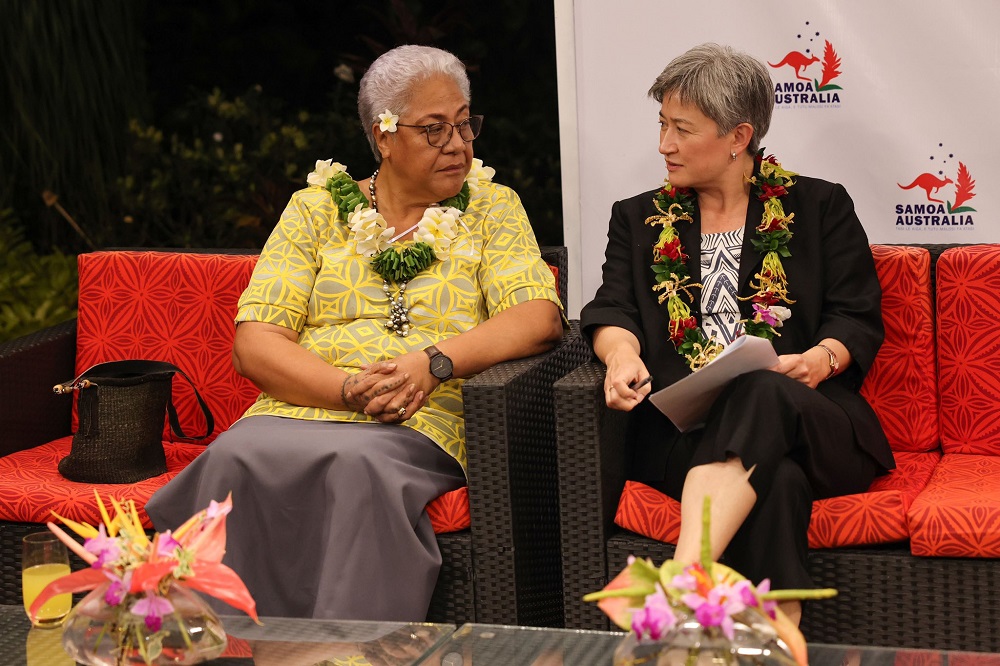Australia’s bipartisan promise to South Pacific people

China makes ambitious offers to South Pacific states. Australia’s great counter-offer is to South Pacific people.
The people dimension must define Australia’s effort for the islands.
The rebuttal to the charge that Australia is driven merely by a China security panic is the thinking about human security for the islands.
Canberra’s pondering on helping Pacific people promises much in the diplomatic duel with China.
As well as its own policy platform, Anthony Albanese’s government inherits an extensive set of proposals for Australia to do much more. The inheritance is a bipartisan effort by the federal parliament.
During the previous term, the parliament’s Joint Committee on Foreign Affairs, Defence and Trade produced a series of linked reports:
- Inquiry into Australia’s defence relationships with Pacific island nations, tabled on 1 April 2021
- One region, one family, one future: deepening relations with the Pacific nations through trade, 3 September 2021
- Inquiry into the human rights of women and girls in the Pacific, 29 November 2021
- Strengthening Australia’s relationships with countries in the Pacific, 30 March 2022.
The last of these reports tied together the many strands of three years of work with these thoughts:
Australia’s relationships with the nations of the Pacific are of enduring importance. They are underpinned by a long shared history, common values, strong ties between peoples, and a natural empathy.
At a time of intensifying geopolitical competition and growing global challenges, especially that of climate change, fostering and strengthening these relationships has assumed a new importance and urgency.
The four reports are the effort of a Canberra awakened from its long Pacific stupor, seeking new thoughts and wanting to do better.
The all-party effort by the foreign affairs committee meshes with the promise Labor made during the election campaign to ‘build a strong Pacific family’. Whatever else of Scott Morrison’s inheritance is discarded, his ‘Pacific family’ coin grows in value and is now Labor language.
Back in 2019, I hailed ScoMo’s family language as ‘goddamn genius’. The response from the University of Tasmania’s Richard Herr was the caution that, ‘While the inclusiveness of the family concept might play well at a rhetorical level … the content of “family values” is very much in the eye of the beholder … Whose norms are to prevail as the Pacific family’s values?’ All true, as to be expected from the wisdom of Herr, with his decades of work in the islands. The test will be deeds to match the words.
Canberra’s vision of the Pacific will be built by what’s done (and how it’s done) not the warmth of the chat. Australia must deliver for the people it embraces as family.
Yet the family imagining matters—action follows the shapes offered by the understanding.
Family is a continuity amid all the changes in the shift from the Morrison to the Albanese government. Indeed, ScoMo got a tacit nod in Albanese’s policy statement on ‘Labor’s plan to build a stronger Pacific family’. As it should, this will be Pacific policy with lots of moving parts. The new government has pledged to:
- create an Australia Pacific defence school
- boost support for Pacific maritime security and surveillance
- lift aid to the South Pacific by $525 million over the four years from 2022–23
- establish a Pacific climate infrastructure financing partnership for the islands and Timor-Leste
- deliver an Indo-Pacific broadcasting strategy that’ll include an extra $8 million for the ABC’s international work and consider restoring shortwave broadcasting to the South Pacific
- extend schemes for islanders to work in Australia and allocate up to 3,000 visas a year for permanent migration from the South Pacific and Timor-Leste.
The new thought coming into view is that Australia offers the Pacific family more than the chance to be seasonal workers. The step to longer-term visas pushes at the doors of easier access and the right to live in Australia.
The parliamentary report on relationships emphasised the need to scale up the labour program to ‘better support career development, and provide pathways for permanent residency’, and recommended creating ‘a dedicated Pacific component within Australia’s permanent migration’.
Getting more Pacific people into Australia will be warmly welcomed by the region. Where the discussion becomes complicated is Australia’s effort to lift the region by holding the region closer.
The foreign affairs committee wants more work on ‘deeper integration’ of the islands. It calls for ‘bold ideas for longer term Pacific region “deep integration” including the creation of a significant compact of free association with countries in the Pacific island region—in particular microstates most vulnerable to climate change instability’.
I’ve been writing about political and economic community with the islands for decades, often bemoaning Canberra’s inability to think new thoughts. And I’ve got plenty of old scar tissue where I’ve been kicked by islanders for being paternalistic or neocolonialist.
The Gulliver dilemma is that Australia, as the giant, must always tiptoe around the South Pacific, just as Gulliver stepped carefully around the fictional South Seas land of Lilliput.
Australia’s talk of integration follows the logic of family; island scepticism centres on what that means for their identities and sovereignty.
When rubbing my paternalist/colonialist bruises, I often respond that deep economic and security integration with Australia hasn’t done much damage to New Zealand’s identity and sovereignty. In the Pacific family, the Kiwi always offers help to the Kangaroo.
The family discussion is happening. Canberra has a lot of fresh thinking to draw on. Now it must do better for the family.
